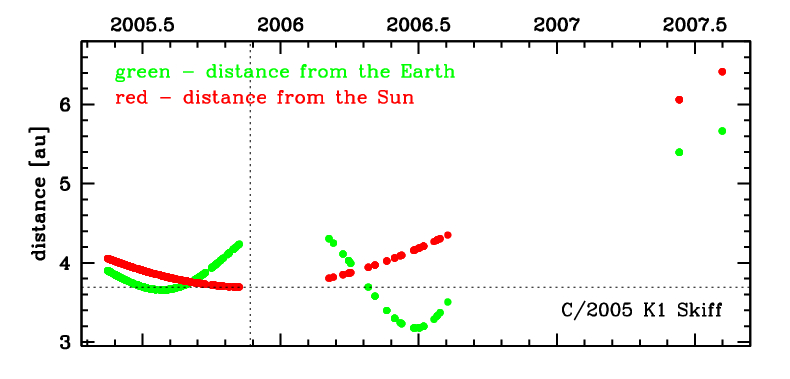C/2005 K1 Skiff
more info
C/2005 K1 was discovered by Brian A. Skiff on 16 May 2005 using the 0.59-m LONEOS Schmidt telescope. Its cometary apperance was soon confirmed [IAUC 8532, 2005 May 20].
This comet made its closest approach to the Earth on 27 June 2006 (3.177 au), 7 months after its perihelion passage.
Solutions given here are based on data spanning over 2.2 yr in a range of heliocentric distances: 4.06 au – 3.693 au (perihelion) – 6.42 au.
This Oort spike comet suffers slight planetary perturbations during its passage through the planetary system, however these perturbations move out this comet from the solar system.
See also Królikowska 2014 and Królikowska and Dybczyński 2017.
This comet made its closest approach to the Earth on 27 June 2006 (3.177 au), 7 months after its perihelion passage.
Solutions given here are based on data spanning over 2.2 yr in a range of heliocentric distances: 4.06 au – 3.693 au (perihelion) – 6.42 au.
This Oort spike comet suffers slight planetary perturbations during its passage through the planetary system, however these perturbations move out this comet from the solar system.
See also Królikowska 2014 and Królikowska and Dybczyński 2017.
| solution description | ||
|---|---|---|
| number of observations | 642 | |
| data interval | 2005 05 16 – 2007 08 06 | |
| data type | perihelion within the observation arc (FULL) | |
| data arc selection | entire data set (STD) | |
| range of heliocentric distances | 4.06 au – 3.69 au (perihelion) – 6.42 au | |
| type of model of motion | NS - non-gravitational orbits for standard g(r) | |
| data weighting | YES | |
| number of residuals | 1246 | |
| RMS [arcseconds] | 0.52 | |
| orbit quality class | 1a | |
| previous orbit statistics, both Galactic and stellar perturbations were taken into account | ||
|---|---|---|
| no. of returning VCs in the swarm | 160 | |
| no. of escaping VCs in the swarm | 4841 | * |
| no. of hyperbolas among escaping VCs in the swarm | 0 | |
| previous reciprocal semi-major axis [10-6 au-1] | 8.03 – 11.02 – 14.16 | |
| previous perihelion distance [au] | 2270 – 2490 – 2700 | |
| previous aphelion distance [103 au] | 140 – 180 – 250 | |
| time interval to previous perihelion [Myr] | 3.11 ± 10 | |
| percentage of VCs with qprev > 20 | 100 | |
| previous_g orbit statistics, here only the Galactic tide has been included | ||
|---|---|---|
| no. of returning VCs in the swarm | 5 | |
| no. of escaping VCs in the swarm | 4996 | * |
| no. of hyperbolas among escaping VCs in the swarm | 2 | |
| previous reciprocal semi-major axis [10-6 au-1] | 5.08 – 8.38 – 11.86 | |
| previous perihelion distance [au] | 2.1 – 2.8 – 3.6 | |
| previous aphelion distance [103 au] | 170 – 240 – 390 | |
| time interval to previous perihelion [Myr] | 3.12 ± 10 | |
| percentage of VCs with qprev < 10 | 100 | |
